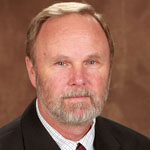Is it curiosity that drives the graduates of Washington University in St. Louis, or is it the graduates of Washington University who drive Curiosity?
Take a close look at the roster of research scientists now immersed in the day-to-day operations of NASA’s latest mission to Mars, and it appears both scenarios are true.
Despite its Midwest location, far away from massive NASA mission control centers in Cape Canaveral, Fla., or Pasadena, Calif., Washington University in St. Louis can boast at least seven graduates — and one current student — now making key contributions to NASA’s current quest to uncover the building blocks of life in the thin red soils of Mars, a mission aptly named “Curiosity.”

Why all the fuss about Mars exploration?
Arvidson attempts to answer this question as part of his Aug. 4 presentation at Planetfest 2012 held in Pasadena, Calif., just prior to Curiosity’s landing on Mars.
In a 23-minute academic presentation titled “Ancient Water-Rich Environments at Meridiani Planum, Mars,” Arvidson offers a recap of his participation in six NASA missions to Mars, noting that the current mission has an important new focus.
“Curiosity, importantly, is going from follow the water and geological exploration to actual geochemistry, where we’re going to try to reconstruct past environments in great detail, and tell whether or not this area at Gale Crater is layers representing habitable environments,” Arvidson says.
“Why are we doing this?” he asks. “We’re doing this to better understand us, that’s Earth.”
And, understanding Mars, he argues, “will undoubtedly come back and lead to a much better understanding of Earth, it’s current and past environments, habitability and life.”
And, while Arvidson’s Planetfest presentation offers plenty of scientific justification for America’s investment in Mars exploration, a recent Tedx talk delivered by Washington University graduate Jeffrey Marlow offers a more humanistic view of what drives mankind’s thirst for exploration.
In a Jan. 14, 2011, presentation at CalTech, Marlow noted that the United States’ landing of the first man on the moon is seen by many as one of the few truly positive landmark events that have become indelibly etched into the cultural memory of modern Americans.
“Exploration has accounted for one of the only positive moments that echoes in the public consciousness, showing us in a very tangible way what we’re capable of as a species. There’s a reason,” Marlow contends, “that every time a politician proposes an enormous world-changing effort, he calls for a moon shot.
“As the settlers of Easter Island showed us, exploration is within our reach. It’s a uniquely human characteristic that has produced some of the most important unifying, positive moments in history, and I believe that the discovery of life on Mars, if it were to happen, would be a similarly profound moment. These moments bring people together and change what it means to be human, and that is why we explore.”